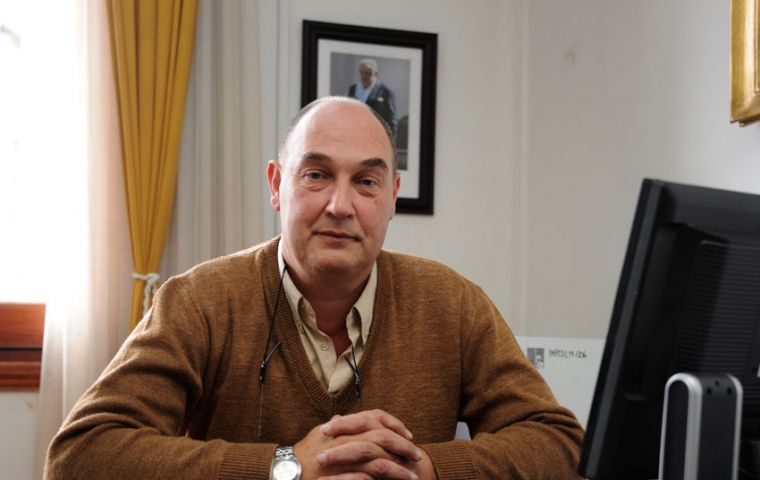MercoPress. South Atlantic News Agency
Royal Bank of Canada raid incident in Uruguay continues to be controversial
 Antonelli said the whole incident was ‘positive’ for Uruguay
Antonelli said the whole incident was ‘positive’ for Uruguay  A week before Vice-president Astori said it was a bad thing for the Royal Bank of Canada to abandon offices in Uruguay
A week before Vice-president Astori said it was a bad thing for the Royal Bank of Canada to abandon offices in Uruguay Uruguay’s Deputy Economy minister Alejandro Antonelli denied any ‘short-circuits’ in the government regarding the Royal Bank of Canada’s raid incident, just a ‘matter of differences’, but insisted that the whole issue is positive for Uruguay since it shows the country’s commitment in combating money laundering and other possible financial crimes.
Less than a week ago, Vice-president Danilo Astori expressed concern with the fact that the Royal Bank of Canada, following a raid to its offices and the seizure of all computers, clients documents and even staff cellular phones, has decided to abandon Uruguay.
“It’s not a good thing for Uruguay that a bank of such relevance should abandon the country, and things (the raid) could have been done in a more careful and procedural way”, said Astori, an economist by training and who in the previous government was Finance minister.
The Vice-president’s comments exposed differences on the issue inside the government of President Jose Mujica since his statements were not well received arguing that he should have been ‘better informed before making any statements’.
Homero Guerrero, Secretary of the Executive, the man who has permanent contact with President Mujica, had stated that the fact the Royal Bank of Canada was leaving the country, “has a positive repercussion for Uruguay” because it is evidence of the existence of controls and that Uruguay has adapted to the new regulations on money laundering and financing of terrorism”.
Communist Senator Eduardo Lorier agreed and said that “we need to look in the long term, since it is a poor favour to the country when control measures on money laundering are not addressed”.
In support of these statements, Deputy minister Antonelli said that the departure of the Royal Bank of Canada “is a very specific situation and I believe they underscore that the country is very much committed because it means we are looking at all the system, which is working very well and is under permanent surveillance”.
However he was quick to add that he didn’t believe there were “short-circuits” in the government on the issue but admitted yes, “different opinions”.
“Maybe my vision of the issue has to do with the fact that I’m member of the National board that checks into possible money laundering cases and I’m well aware of the great efforts Uruguay is making to improve the transparency in the financial sector”, said Antonelli.
Last June on request from an Argentine judge who was looking into money laundering and tax elusion regarding the sale of football players to Europe, a Uruguayan Organized Crime magistrate Adriana de los Santos complied with the request and ordered the raid of the Royal Bank of Canada offices in the Zonamerica Free Zone and at three other financial institutions.
For reasons yet to be explained there were Argentine treasury police officers at the raid and although they did not intervene, the Uruguayan forces seized all the computers at the bank, all documents on the bank’s customers, pen drives and even frisked and took the cellular phones from the staff.
Some of the computers have been returned but the rest are being checked by a court group and the Executive branch Money laundering office to which Antonelli referred. In the meantime the Royal Bank of Canada said it was restructuring it services and as part of that plan would be leaving Uruguay effective next October. All clients were invited to transfer their accounts to the bank’s offices in other countries.
The free zone Zonamerica complained about the procedure and so did the Uruguayan private banks association claming the whole incident looked more like a raid on a store looking for smuggled goods, and called for a protocol procedure in the future when similar situations arise. This option was supported by Astori who said the issue should be under the control of the Central bank, which has the specialized staff for such cases.
The whole incident was considered ‘extremely delicate’ since many Argentine, Brazilian and Paraguayan citizens have savings in the Uruguayan banking system, since they are apprehensive of their own systems. This is particularly true regarding Argentina and the current government of President Cristina Fernandez which by all means is trying to get information on the accounts and assets of Argentines overseas.
There are fears that even when Uruguay is trying to strictly comply with OECD measures related to money laundering and exchange of information, the Royal Bank of Canada case could have infringed the ‘adventure fishing’ rule which specifically bars any actions or procedures outside the determined request.




Top Comments
Disclaimer & comment rules-

-

-

Read all commentsSo now we have Deputy Ministers who are fuck-ups as well!
Aug 26th, 2013 - 09:03 am 0Uruguay is really blessed in the number of twats in government that's for sure.
Let us hope that when Vasquez gets to be President he can kick all these dumb fucks out of office.
Wasn't the sale of “Cedinas” in Argentina similar to money laundering?
Aug 26th, 2013 - 12:35 pm 0@ 2 bushpilot
Aug 26th, 2013 - 03:39 pm 0Not similar to money laundering, EXACTLY money laundering but done by the “government” of The Dark Country: that is what make the RBC fiasco so stupid as far as Uruguay are concerned.
I am REALLY PISSED OFF OVER THIS!
Commenting for this story is now closed.
If you have a Facebook account, become a fan and comment on our Facebook Page!